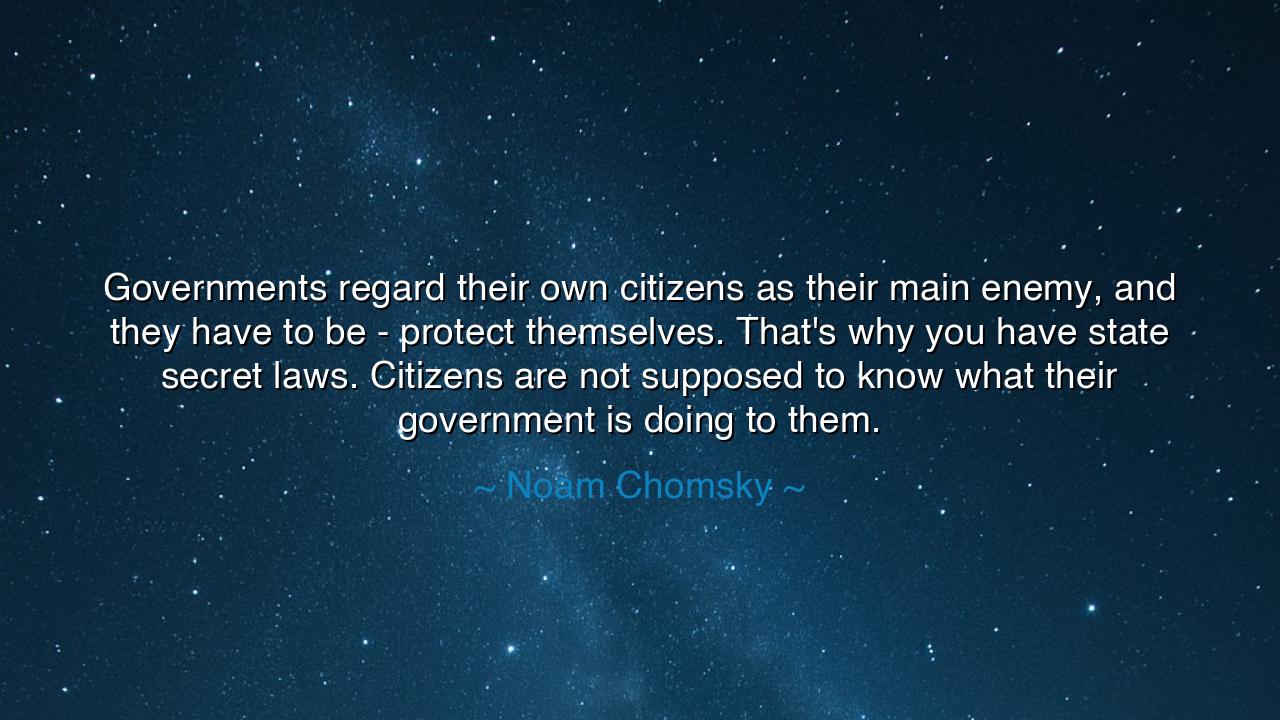
Governments regard their own citizens as their main enemy, and
Governments regard their own citizens as their main enemy, and they have to be - protect themselves. That's why you have state secret laws. Citizens are not supposed to know what their government is doing to them.






In an age when the voices of power speak in polished lies and the truth hides beneath sealed documents, the words of Noam Chomsky rise like a somber warning carved upon the walls of time: “Governments regard their own citizens as their main enemy, and they have to protect themselves. That’s why you have state secret laws. Citizens are not supposed to know what their government is doing to them.” These words pierce the illusion of safety that so many cling to. They strip away the veil of civility that often conceals the cold machinery of power. In them lies an ancient truth—that those who rule, fearing the light, often build their thrones upon the shadow of secrecy.
Chomsky’s voice comes from the long lineage of thinkers who dared to question authority, to remind mankind that power, unchecked, inevitably turns inward. He speaks not as an enemy of government, but as its necessary conscience, its whispering reminder that the governed are not property, but people. His insight was born in an age of wars without honor and secrets without end—an age of surveillance, manipulation, and deceit carried out in the name of security. He teaches that when governments begin to fear transparency, they have already begun to fear their own citizens—and that fear, like a poison, transforms protector into predator.
This truth is no stranger to history. Consider the empire of the Soviet Union, whose rulers, in the name of protecting the people, spied upon every thought and silenced every whisper. Neighbors betrayed neighbors, not out of loyalty, but out of terror. Files thicker than books chronicled the private lives of citizens who had no crimes but curiosity. The leaders claimed it was for the safety of the state. Yet as Chomsky reminds us, it was never the enemies abroad who endangered them—it was their own people, their own conscience, their own hunger for freedom that they feared most. For no ruler dreads a foreign army as much as he dreads the awakening of his own people.
And yet this warning is not confined to tyrannies alone. Even in the halls of democracy, where freedom is praised in speeches and carved into marble, the same instincts of secrecy take root. Behind closed doors, in hidden rooms and coded systems, decisions are made that affect the lives of millions. The people are told, “Trust us; it is for your protection.” Thus arise the state secret laws, the fortresses of silence where truth is held captive. A government that hides from its citizens, claiming the mask of security, is like a physician who hides the diagnosis from his patient—he may delay panic, but he ensures decay.
Chomsky’s words, stark and unflinching, reveal a deeper wound in the relationship between rulers and the ruled. When a government begins to regard its citizens as the enemy, the covenant of trust is broken. What was meant to be a body serving its people becomes an organism feeding upon them. Fear replaces duty, and control replaces care. The citizen, once the foundation of the state, becomes the subject of its suspicion. And when truth becomes dangerous, every act of honesty becomes rebellion.
Let us look to the example of Edward Snowden, who in our own age exposed the vast machinery of surveillance that spanned continents and invaded the privacy of millions. His revelation was not born of malice, but of conscience—of the ancient belief that truth belongs to the people, not to the powerful. Yet for unveiling what his government had hidden, he was branded a traitor. Here, Chomsky’s words come alive: a government that fears its own truth will always brand truth-tellers as enemies. Snowden’s exile is the modern echo of every sage, every prophet, every dissenter who dared to speak light into the dark chambers of authority.
The lesson is both bitter and luminous: trust no power that hides its deeds, and revere no authority that demands blind faith. A healthy nation must be one where the people can see and question, where truth flows like air and cannot be contained. Governments are born to serve, not to conceal; their strength lies in the courage to be accountable, not in the cunning to deceive. The wise citizen, therefore, must never grow complacent. Freedom is not a gift—it is a vigil, kept by eyes that refuse to close and voices that refuse to be silenced.
So, my child of the future, remember this: secrecy is the language of fear, but truth is the voice of liberty. When your rulers tell you that you cannot know what they do, know that they have already forgotten whom they serve. Ask, question, challenge—these are not acts of rebellion, but of loyalty to the highest good. For as long as there are people who demand to see the truth, tyranny will never sleep easy. And as long as the citizen stands upright and unafraid, the government will remember that it governs not by secrecy, but by the sacred consent of the people.






AAdministratorAdministrator
Welcome, honored guests. Please leave a comment, we will respond soon